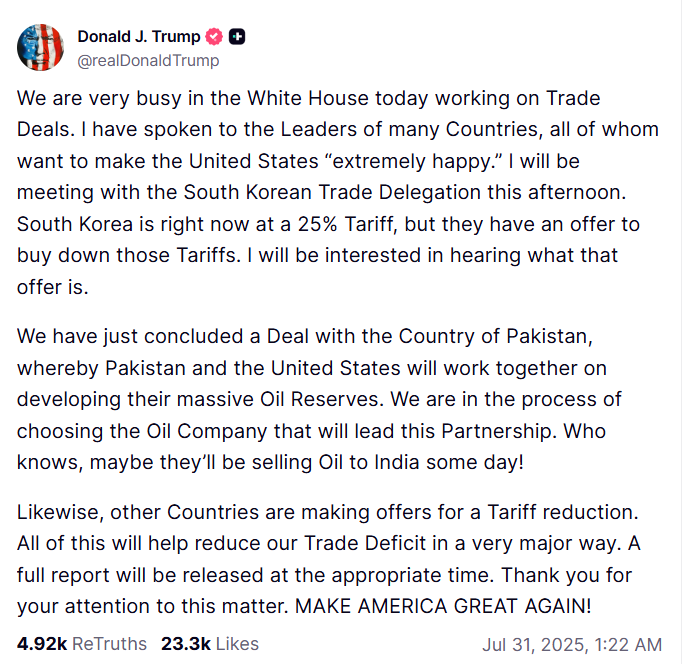Trump Slams Canada's Palestine Recognition As Roadblock In Trade Deal—Signs Agreement With Pakistan That Doesn't Even Recognize Israel
President Donald Trump criticized Canada's move to back statehood for Palestine as a major roadblock to a new trade deal, even as his administration announced a new partnership with Pakistan, a country that does not recognize Israel.
What Happened: The conflicting approaches to foreign policy were highlighted by a series of statements and social media posts from the White House and other news outlets on Thursday.
In a post on Truth Social, President Trump declared, “Wow! Canada has just announced that it is backing statehood for Palestine. That will make it very hard for us to make a Trade Deal with them.”
The statement came just ahead of an Aug. 1st deadline for new U.S. trading terms, with Canada facing a potential 35% tariff on goods not covered by the USMCA agreement.
Canadian Prime Minister Mark Carney announced that his country's recognition of a Palestinian state at the UN General Assembly would be predicated on reforms excluding Hamas.
Meanwhile, in a separate Truth Social post, Trump detailed a new deal with Pakistan. “We have just concluded a Deal with the Country of Pakistan, whereby Pakistan and the United States will work together on developing their massive Oil Reserves,” he wrote.
This partnership with Pakistan is notable given the country's strong anti-Israel stance, as detailed in a report from the Islamic newsmagazine Crescent International.
The magazine reported on an ongoing debate within Pakistan about whether to recognize Israel, with the majority of arguments against recognition, calling it a “colonial settler entity.”
Why It Matters: According to Reuters, Canada is the second-largest U.S. trading partner, following Mexico. It bought $349.4 billion of U.S. goods last year and exported $412.7 billion to the U.S.
Meanwhile, as per the U.S. Trade Representative (USTR), total goods trade with Pakistan was an estimated $7.3 billion in 2024. U.S. goods exports to Pakistan in 2024 were $2.1 billion, up 4.4% or $90.9 million from 2023.
The contrast between Trump's condemnation of Canada and his new deal with Pakistan, a non-recognizing nation, underscores a seemingly inconsistent foreign policy driven by trade priorities.
Trump told reporters on Tuesday this week that India could face tariffs of 20% to 25% on exports to the United States as the Aug. 1 deadline approaches without a finalized agreement. As per USTR, India exports nearly $130 billion of goods to the U.S.
On Wednesday, in a Truth Social post, Trump added that India will also face a “penalty" for buying Russian energy and military equipment, "at a time when everyone wants Russia to STOP THE KILLING IN UKRAINE," he says.
Meanwhile, the U.S. Commerce Secretary Howard Lutnick warned that Aug. 1 would be the “hard deadline” for countries that haven’t yet signed a trade deal with the U.S. to start paying the tariffs.
Price Action: The SPDR S&P 500 ETF Trust (NYSE:SPY) and Invesco QQQ Trust ETF (NASDAQ:QQQ), which track the S&P 500 index and Nasdaq 100 index, respectively, declined on Thursday. The SPY was down 0.38% at $632.08, while the QQQ declined 0.53% to $565.01, according to Benzinga Pro data.
Read Next:
Disclaimer: This content was partially produced with the help of AI tools and was reviewed and published by Benzinga editors.
Photo courtesy: Shutterstock
© 2025 Benzinga.com. Benzinga does not provide investment advice. All rights reserved.
Posted-In: Politics





